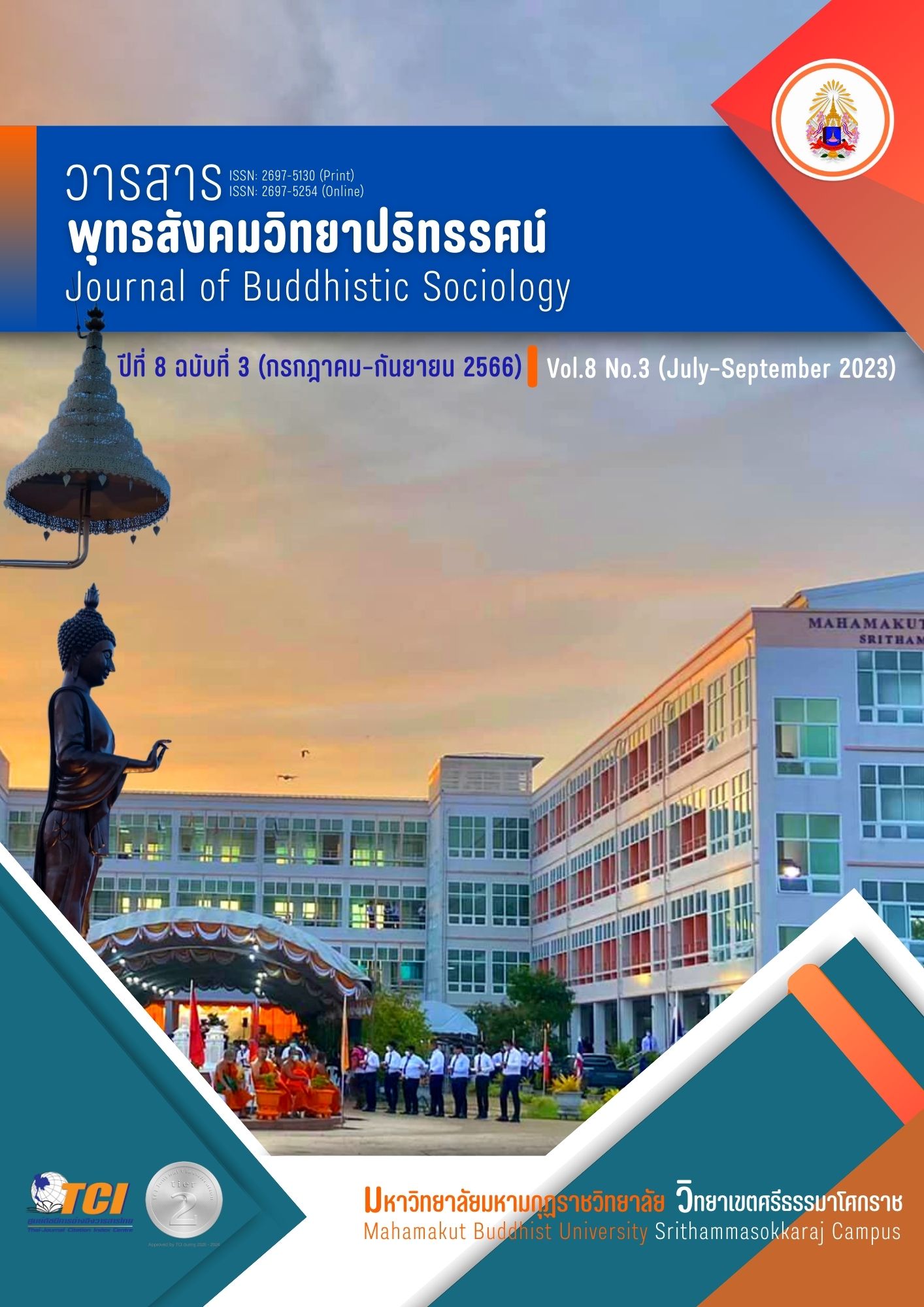SOCIALIZATION THROUGHOUT THE BUDDHIST PROCESS
Main Article Content
Abstract
An academic article on “Socialization throughout the Buddhist Process” aims to study socialization throughout the Buddhist process. We used research methods and analysis from documents, research papers, books, textbooks, dictionaries, and scriptures in various religions, both Thai and English. Socialization means the process of educating members of society to learn social order in order to appreciate and apply rules. Rules of conduct as a guideline for conduct Socialization is a necessity that human beings must acquire throughout their lives. As for socialization throughout the Buddhist process, it has adopted the principles of Buddhism, namely the Threefold Principles, which consist of morality, concentration, and wisdom. And the eightfold path, which is the guideline or practice that is a middle way of ethics that creates a mortal person to be a noble person It is a virtue that promotes human resource development. It consists of eight virtues, as follows: 1) Right view 2) Right Intention 3) Right speech 4) Right Action 5) Right livelihood 6) Right effort; 7) Right mindfulness; and 8) Right concentration. Therefore, the application of Buddha Dharma both in the worldly and globally in human resource development is beneficial to both human beings as individuals. and as a resource for the organization and the nation. Make people human beings with both talent, goodness, and happiness.
Article Details

This work is licensed under a Creative Commons Attribution-NonCommercial-NoDerivatives 4.0 International License.
References
จำนง อดิวัฒนสิทธิ์. (2547). สังคมวิทยา. กรุงเทพมหานคร: มหาวิทยาลัยเกษตรศาสตร์.
จิราภา ธรรมไพศาล. (ม.ป.ป.). หน้าที่พลเมืองและศีลธรรม. อุบลราชธานี: สำนักงานเขตพื้นที่การศึกษามัธยมศึกษา เขต 29.
ดำรง ฐานดี. (2522). สังคมวิทยา-มานุษยวิทยาเบื้องต้น. พระนคร: โรงพิมพ์รามคำแหง.
นิยพรรณ วรรณศิริ. (2540). มานุษยวิทยาสังคมและวัฒนธรรม. กรุงเทพมหานคร: ภาควิชาสังคมวิทยาและมานุษยวิทยา คณะสังคมศาสตร์ มหาวิทยาลัยเกษตรศาสตร์.
ผ่องพันธุ์ มณีรัตน์. (2529). มานุษยวิทยากับการศึกษาคติชาวบ้าน. กรุงเทพมหานคร: มหาวิทยาลัยธรรมศาสตร์.
พระครูอุทุมพรภัทรธรรม กตปุญฺโญ (ผ่อนผัน) และพระครูสุธีคัมภีรญาณ. (2563). ความสัมพันธ์ของดนตรีกับการขัดเกลาทางสังคมกับแนวคิดการขัดเกลาทางสังคมในพระพุทธศาสนา. Journal of Buddhist Education and Research, 6(2), 358-369.
พระธรรมปิฎก (ป.อ. ปยุตฺโต). (2546). พจนานุกรมพุทธศาสนา ฉบับประมวลศัพท์ (พิมพ์ครั้งที่ 11). กรุงเทพมหานคร: มหาจุฬาลงกรณราชวิทยาลัย.
พระพิษณุพล สุวณฺณรูโป (รูปทอง). (2558). การขัดเกลาสังคมโดยองค์กรศาสนาในพระพุทธศาสนา. เชียงใหม่: มหาวิทยาลัยมหาจุฬาลงกรณราชวิทยาลัย.
พิสมัย วิบูลย์สวัสดิ์. (2529). จิตวิทยาสังคมร่วมสมัย. กรุงเทพมหานคร: สยามศึกษา.
ราชบัณฑิตยสถาน. (2549). พจนานุกรมศัพท์สังคมวิทยา อังกฤษ-ไทย ฉบับราชบัณฑิตยสถาน (พิมพ์ครั้งที่ 3). กรุงเทพมหานคร: ราชบัณฑิตยสถาน.
วิชัย ภู่โยธิน และคณะ. (2551). หน้าที่พลเมือง วัฒนธรรมและการดำเนินชีวิตในสังคม ม.4-ม.6 (พิมพ์ครั้งที่ 1). กรุงเทพมหานคร: อักษรเจริญทัศน์.
สัญญา สัญญาวิวัฒน์. (2551). การบริหารจัดการแนวพุทธ (พิมพ์ครั้งที่ 2). กรุงเทพมหานคร: จุฬาลงกรณ์มหาวิทยาลัย.
สุพัตรา สุภาพ. (2536). สังคมวิทยา. กรุงเทพมหานคร: ไทยวัฒนาพานิช.
สุมน อมรวิวัฒน์. (2547). กัลยาณมิตรนิเทศ. กรุงเทพมหานคร: ดับบลิว.เจ.
เสฐียรพงษ์ วรรณปก. (2553). คำบรรยายพระไตรปิฎก. กรุงเทพมหานคร: สถาบันลือธรรม.


